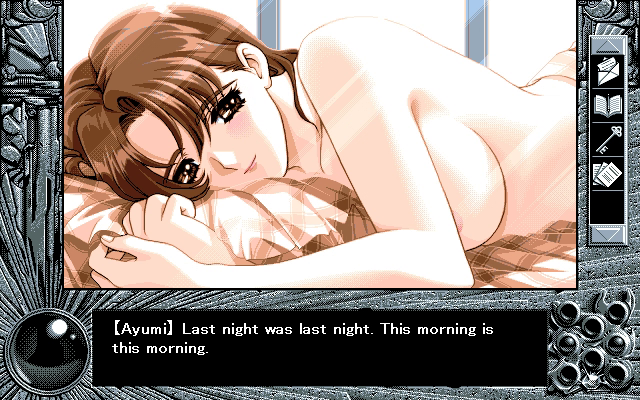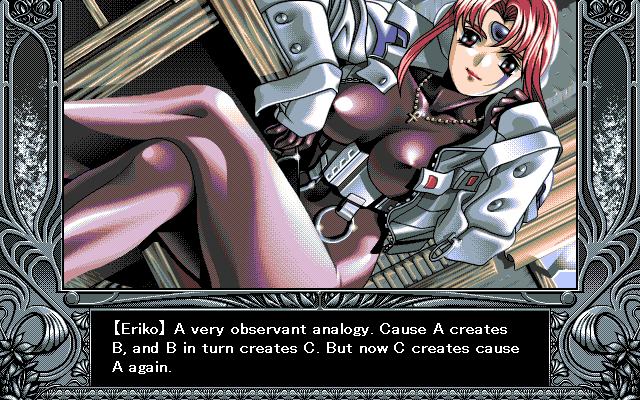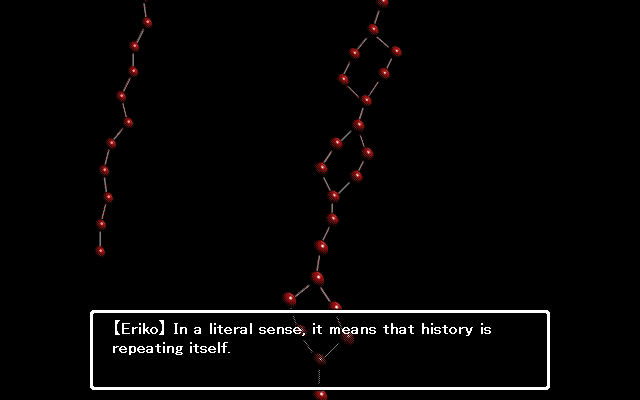YU-NO Is Bad
Unlike Yu-no, the other women in Takuya’s life, the other women the player is encouraged to fall in love with—Ayumi, Eriko, Mitsuki, Mio, and Kanna—have interiority and motivations of their own. Rather than unconditional Kaytia-like affection and unquenchable libidos, these women have expectations of reciprocity. Despite how the camera and gameplay and hence Takuya and the player always ogle their bodies, these women are often not sexually available. Even Ayumi, aside from Sayless and Yu-no the most submissive of the possible partners, may ask Takuya, as they lay in bed after their first night as a couple, not to kiss her breasts:

And Takuya accepts this, forcing the player to relent. While Sayless is as much a pet as a sexual partner, she too has some agenda of her own, a history outside of Takuya, in her former life as “Careless” and escape from the Imperial Capital that she hides from her husband until her death.
In contrast, the ultimate love interest the script forces the player to pursue to the exclusion and abandonment of all others, the ultimate embodiment of the familial/sexual love that in YU-NO overlap, Yu-no, from the time she can talk, begs for her father’s sexual attention, and the sight of her turns Takuya on. Kanno assumes the player is also pedophile. Aside from an uncomplicated and barely explored selflessness, incestuous love for her father is the title character’s most defining trait. Takuya abandons his community and his friends and academic and social responsibilities to regress into an infantile sexual bliss with a lover completely subservient to his desires, a lover who is at once his daughter, his mother, and his wife.
The ending of YU-NO may seem a condemnation of Takuya, a character who not only fails to overcome the flaws with which his father’s abuse has yoked him but who, craving his mother’s womb, regresses into the most disturbing escape from reality imaginable. Within the Freudian framework, an unresolved Oedipus complex is infantile, a sign of stunted psychological development. But Kanno does not present Takuya’s retreat into incest as a nightmare of failed responsibility. Nor is Yu-no’s lust for her father a sign of immaturity or utter despair at her fate in the rite of the priestess. YU-NO elevates parent–child incest and withdrawal from all human connection and responsibility as an Edenic height of love and dedication, a love so pure it saves the world and starts the “flow of causality”—a love from which the presentation cuts away the moment Takuya penetrates his daughter because this deed, unlike every other sex scene, is too sweet and noble for the player to masturbate over.
YU-NO idealizes the complete withdrawal from society and personal growth in favor of unchallenging, incestuous stasis. Given Kanno’s misanthropic presentation of humanity as cruel rabble demanding the strong hand of a paternal tyrant to slap them into line, the conclusion that the world, a place where rape and slavery is just life, is best abandoned in favor of parent–child incest might become less shocking.
Kanno fixates on a pattern Eriko describes in the Epilogue:

In YU-NO, beginnings and endings parallel each other. The ADMS segment loops the same pattern of three days, Takuya’s end reverting him to his beginning. The world of Dela Grante follows an 8000-year time loop in 400-year cycles that successively dump priestesses into Sakaimachi. These predestined effects that loop back into their causes mirror the parent-like child returning sexually to their parent.
